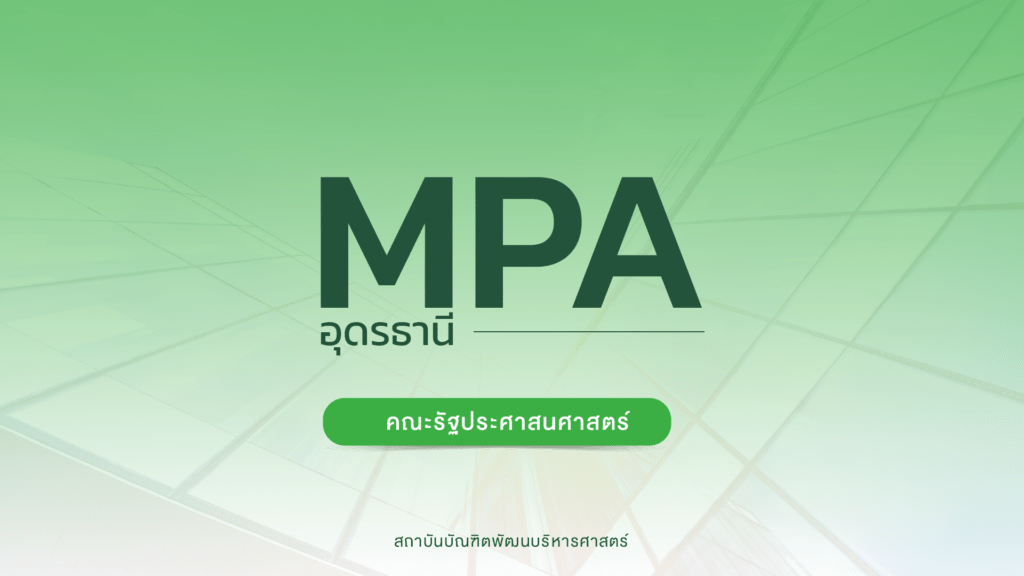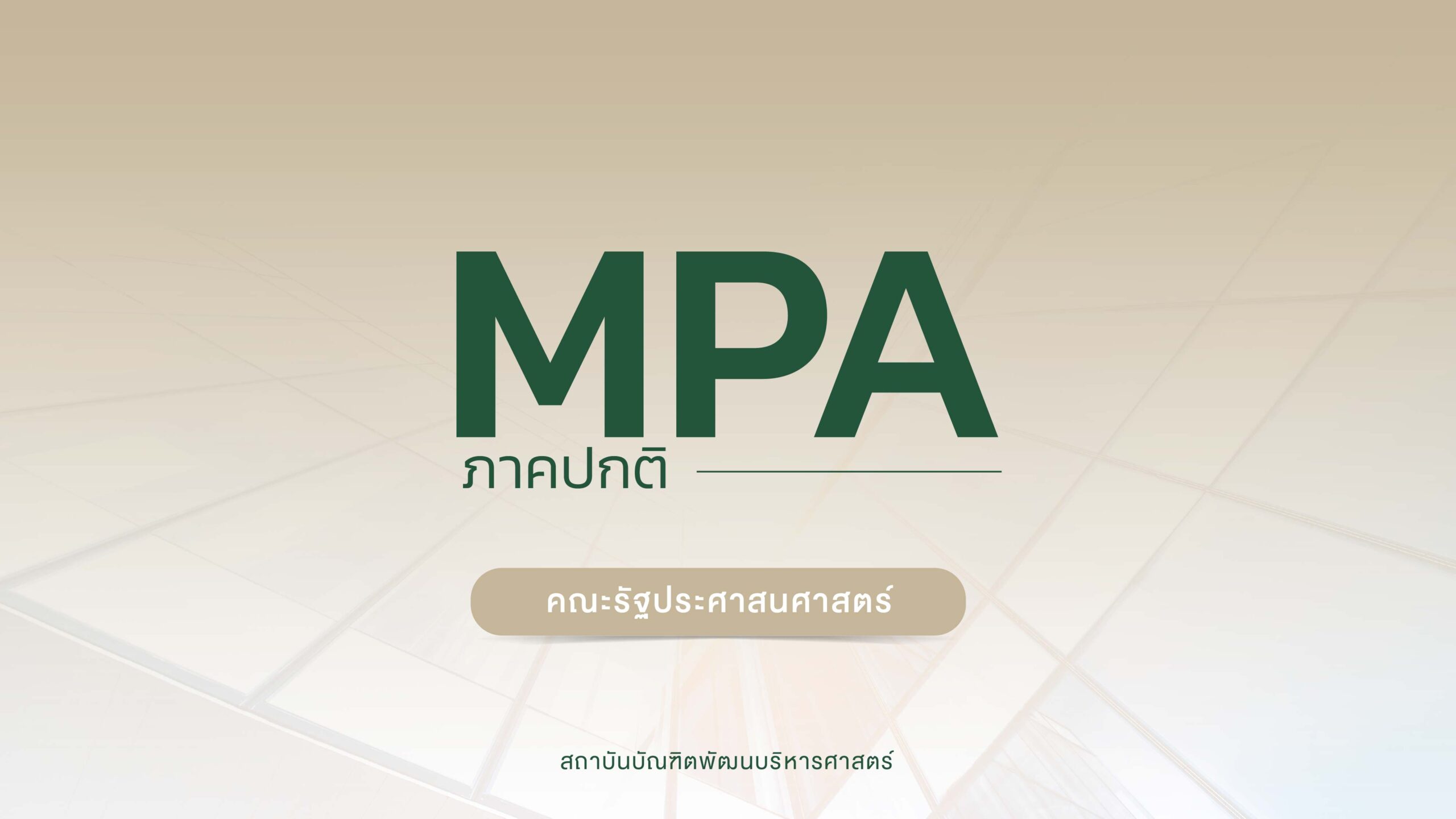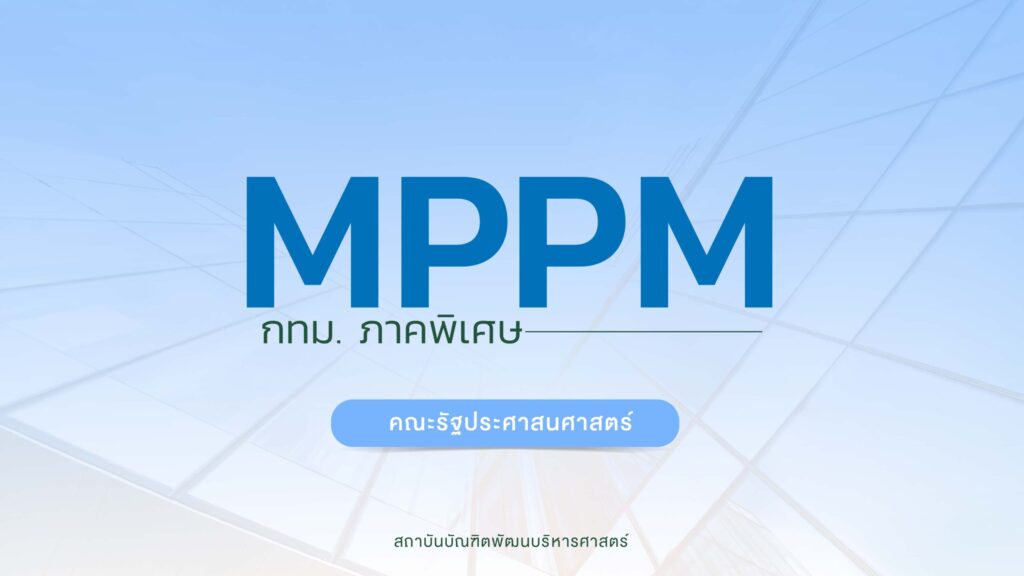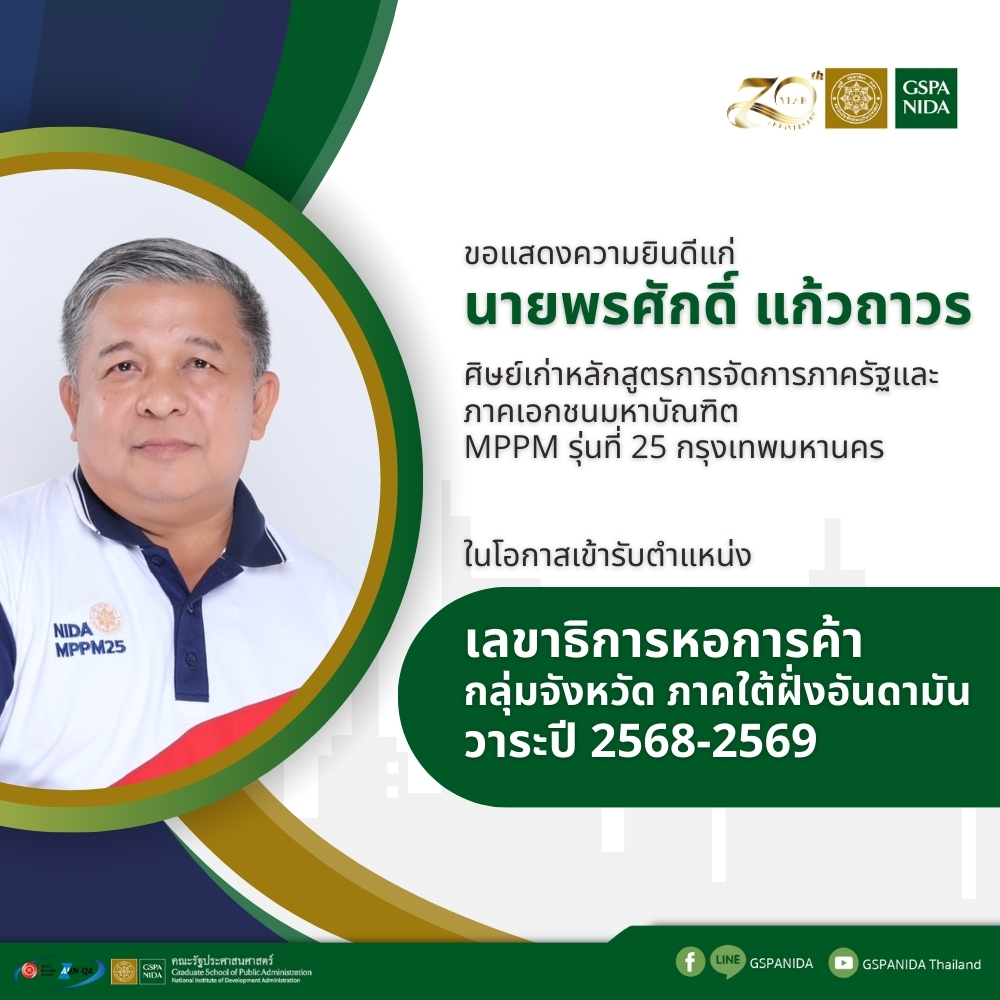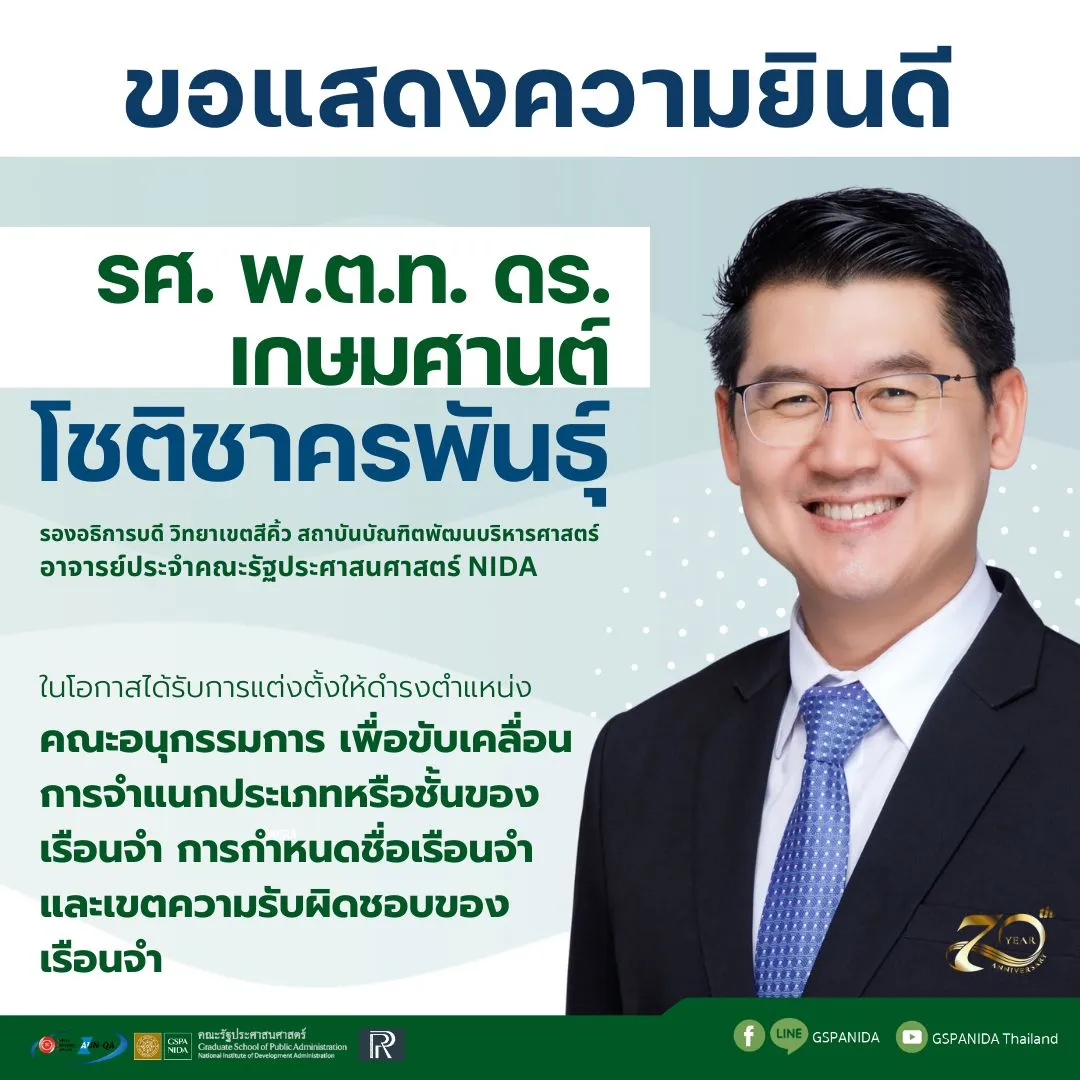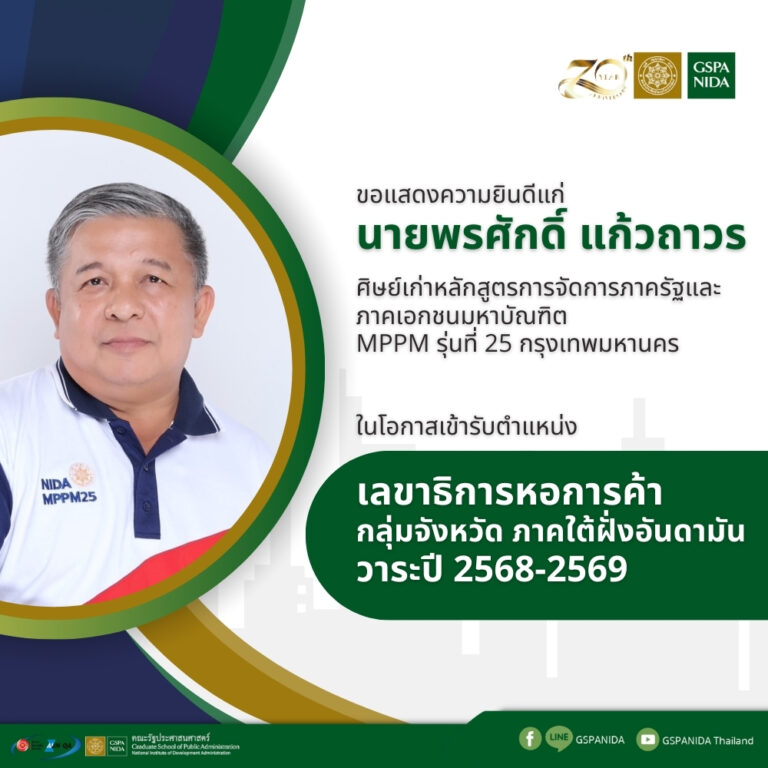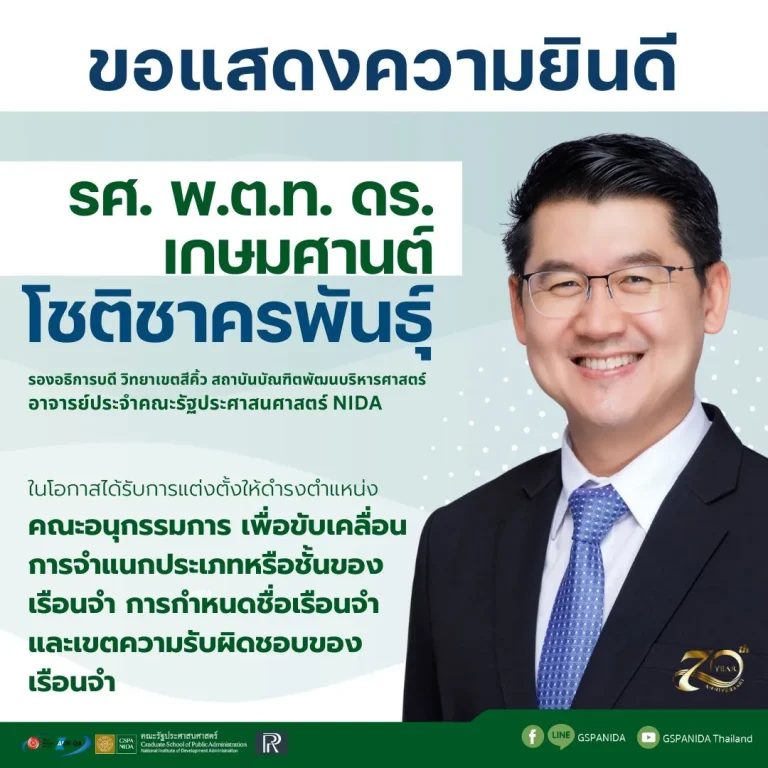คณะรัฐประศาสนศาสตร์ สถาบันบัณฑิตพัฒนบริหารศาสตร์ |
- หน้าหลัก
- เกี่ยวกับคณะ
- ประกาศคณะ
- หลักสูตร
- วิชาการ
- ผู้สนใจสมัคร
- นักศึกษาปัจจุบัน
- ศิษย์เก่า
- บริจาคเพื่อการศึกษา
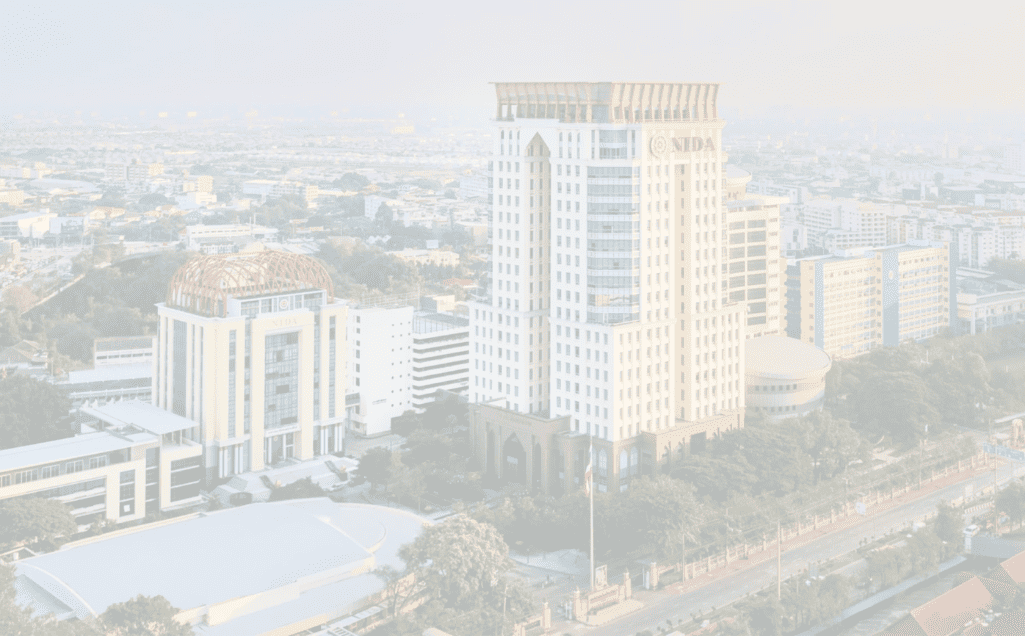
คณะรัฐประศาสนศาสตร์
สถาบันบัณฑิตพัฒนบริหารศาสตร์
รศ.นิด้า สร้างปัญญาเพื่อการพัฒนาที่ยั่งยืน







-
 รศ. ดร.ดนุวัศ สาคริก รองคณบดีฝ่ายบริหาร
รศ. ดร.ดนุวัศ สาคริก รองคณบดีฝ่ายบริหารเราเชื่อว่าผู้นำที่ดีในโลกยุคใหม่ ต้องมีทั้งความเข้าใจในความซับซ้อนของรัฐ ความเปลี่ยนแปลงของโลก และพลวัตของเทคโนโลยีดิจิทัล คณะรัฐประศาสนศาสตร์ นิด้า จึงมุ่งมั่นสร้างผู้นำที่มีคุณธรรม วิสัยทัศน์ และความสามารถในการนำการเปลี่ยนแปลง เพื่อขับเคลื่อนประเทศให้ก้าวสู่อนาคตอย่างมั่นคงและยั่งยืน
-
 รศ. ดร.ติญทรรศน์ ประทีปพรณรงค์ รองคณบดีฝ่ายวิชาการ
รศ. ดร.ติญทรรศน์ ประทีปพรณรงค์ รองคณบดีฝ่ายวิชาการพัฒนาศักยภาพของผู้นำภาครัฐและภาคเอกชน ในยุคดิจิทัล
ที่เน้นขับเคลื่อนองค์การให้บรรลุเป้าหมายตามหลักธรรมาภิบาลอย่างยั่งยืน -
 ผศ. ดร.ธนาพร เต็งรัตนประเสริฐ รองคณบดีฝ่ายวางแผนและพัฒนา
ผศ. ดร.ธนาพร เต็งรัตนประเสริฐ รองคณบดีฝ่ายวางแผนและพัฒนาคณะรัฐประศาสนศาสตร์มุ่งเน้นการเรียนรู้เชิงลึก พร้อมส่งเสริมการปรับใช้ความรู้ในบริบทที่หลากหลาย
โดยปลูกฝังแนวคิด “Servant Leadership” ผ่าน “Outward Mindset”
ที่มุ่งเน้นให้ความสำคัญกับเป้าหมายส่วนรวมและเสริมสร้างความร่วมมือและประสานพลัง
อันจะนำไปสู่ความก้าวหน้าทางสังคมและการพัฒนาอย่างยั่งยืน
พ.ศ. 2511-2567
ปีการศึกษา 2565
ด้านหลักสูตร ปีการศึกษา 2565
-
 นายบารมี วรรณพงศ์เจริญ (ฟ้า) อาจารย์สาขาวิชาการจัดการ คณะบริหารธุรกิจ มหาวิทยาลัยวงษ์ชวลิตกุล
นายบารมี วรรณพงศ์เจริญ (ฟ้า) อาจารย์สาขาวิชาการจัดการ คณะบริหารธุรกิจ มหาวิทยาลัยวงษ์ชวลิตกุล"สิ่งที่มีค่าที่สุดสำหรับการใช้ชีวิต คือการเรียนรู้ เพราะมันเป็นโอกาสที่จะทำให้เราได้มีทางเลือกมากขึ้นในการใช้ชีวิต" MPPM NIDA คือหลักสูตรที่ให้ ความรู้ ทักษะ ประสบการณ์ สังคม เปิดโลกใหม่ๆ ได้เรียนรู้องค์ความรู้ทั้งด้านการบริหารงานภาครัฐเเละภาคเอกชน เป็นโอกาสที่ดีในการพัฒนาตนเองให้สามารถประยุกต์ใช้ความรู้ที่มีให้เข้ากับการบริหารงานทุกบริบท "
-
 นายบุญเหลือ บารมี รองผู้ว่าราชการจังหวัดพิษณุโลก
นายบุญเหลือ บารมี รองผู้ว่าราชการจังหวัดพิษณุโลก"นับเป็นโอกาสที่ดีมาก ที่ได้เข้าศึกษาหลักสูตรปริญญาโท จากคณะรัฐประศาสนศาสตร์ สถาบันบัณฑิตพัฒนบริหารศาศตร์(NIDA) คณาจารย์มีคุณภาพ นักศึกษามีความหลากหลาย มี Connection ที่ดี สามารถทำงานในหน้าที่ได้อย่างมีประสิทธิภาพ ส่งผลให้มีความเจริญในหน้าที่การงาน โดยการนำความรู้ ประสบการณ์ที่ได้รับ ไปพัฒนางาน เป็นส่วนหนึ่งในการพัฒนาสังคม และพัฒนาประเทศชาติอย่างยั่งยืนต่อไป"
-
 นายไพฑูรย์ อินอุทัย รักษาการกรรมการผู้จัดการ บริษัท เอ็มซี อะโกร-เคมิคัล จำกัด ในเครือบริษัท ไทยเซ็นทรัลเคมี จำกัด (มหาชน)
นายไพฑูรย์ อินอุทัย รักษาการกรรมการผู้จัดการ บริษัท เอ็มซี อะโกร-เคมิคัล จำกัด ในเครือบริษัท ไทยเซ็นทรัลเคมี จำกัด (มหาชน)"หลักสูตรปริญญาเอกรัฐประศาสนศาสตร์ สาขาการจัดการทรัพยากรมนุษย์ของนิด้า
แหล่งบูรณาการความรู้ในบริบทภาครัฐและเอกชน ช่วยพัฒนาศักยภาพของตนเองและสามารถนำความรู้ไปปรับใช้เพื่อยกระดับสมรรถนะทรัพยากรมนุษย์ในองค์กรเพื่อสนับสนุนการพัฒนาเศรษฐกิจและประเทศ" -
 Miss Tran Thi Thanh Hang (Katie) Assistant Learning & Development Manager Sheraton Nha Trang Hotel & Spa Co-chairman Vietnam & Cambodia Marriott Junior Business Council
Miss Tran Thi Thanh Hang (Katie) Assistant Learning & Development Manager Sheraton Nha Trang Hotel & Spa Co-chairman Vietnam & Cambodia Marriott Junior Business Council"Thanks to GSPA-NIDA, I have a chance to find the great parts of myself that I have not realized before. I have been more confident to empower myself with the new wisdom and explore the skills that I can apply to my own world. Even though I am a foreigner living in Thailand for the first time, the energized learning environment and kind support from GSPA have helped me overcome all challenges. I also do hope that many people, especially young talents, can reach these prospects. My memorable journey has been a two-year MPA program, and now it is your turn. Let’s build up your bright journey with MPA from GSPA-NIDA."
-
 นางสาวสุพิชา มีกลุ่ม (เมเม่) เจ้าพนักงานปกครองชำนาญการ (ปลัดอำเภอ) สังกัด กองวิชาการและแผนงาน กรมการปกครอง กระทรวงมหาดไทย
นางสาวสุพิชา มีกลุ่ม (เมเม่) เจ้าพนักงานปกครองชำนาญการ (ปลัดอำเภอ) สังกัด กองวิชาการและแผนงาน กรมการปกครอง กระทรวงมหาดไทย"ปัจจุบันโลกแห่งการทำงานมีการแข่งขันสูง การเรียน MPA NIDA ช่วยฝึกฝนให้เรามีความคิดที่โดดเด่น เราจะได้ฝึกการวิเคราะห์เชิงลึก การใช้เครื่องมือการบริหารทั้งภาครัฐและเอกชนที่ประยุกต์ใช้ในการทำงานได้จริง
นอกจากนี้ การลงทุนทางการศึกษาที่ MPA NIDA ไม่เพียงแต่ได้พัฒนาองค์ความรู้ของตนเอง แต่หลักสูตรที่นี้จะสร้างให้เราเป็นคนที่สามารถสร้างการเปลี่ยนแปลงที่ดีเพื่อสังคมความรู้ ประสบการณ์ จากคณาจารย์ที่มีคุณภาพ และความทันสมัย พร้อมด้วยเครือข่าย นักศึกษา GSPA Network จากหลากหลายอาชีพทั่วประเทศ
เป็นบันไดแห่งความสำเร็จของเส้นทางชีวิตอีกหนึ่งขั้นที่ทุกคนในครอบครัว MPA NIDA จะได้รับ" -
 ดร.พรเทพ ศักดิ์สุจริต กรรมการผู้จัดการบริษัท อุดร มาสเตอร์เทค จำกัด (บริษัท ผลิตชิ้นส่วนรถยนต์เพื่อการส่งออก)
ดร.พรเทพ ศักดิ์สุจริต กรรมการผู้จัดการบริษัท อุดร มาสเตอร์เทค จำกัด (บริษัท ผลิตชิ้นส่วนรถยนต์เพื่อการส่งออก)"ผมมีธุรกิจได้จนถึงทุกวันนี้ เพราะ นิด้า …
ก่อนเรียนนิด้า เป็นพนักงานบริษัท หลังจากจบนิด้า ออกทำธุรกิจเอง
เอาองค์ความรู้จากการเรียนมาสร้างบริษัทด้วยตัวเอง
และคอนเน็คชั่นกับเพื่อนร่วมรุ่นและเพื่อนต่างรุ่น มีความสำคัญมาก
ช่วยส่งเสริมให้ประสบผลสำเร็จในการทำธุรกิจอย่างแท้จริง" -
 นางสาวรินดา ดาววิจิตร กรรมการผู้จัดการ บริษัท ไฮเทคนคร กรุ๊ป จำกัด
นางสาวรินดา ดาววิจิตร กรรมการผู้จัดการ บริษัท ไฮเทคนคร กรุ๊ป จำกัด"Knowledge Reshape Destiny"
การศึกษาสามารถเปลี่ยนแปลงโชคชะตาชีวิตได้ และการเรียนในระดับปริญญาเอก ทำให้เรามีโอกาสและทางเลือกในชีวิตมากขึ้น" -
 นายสุทธิพงษ์ คล้ายอุดม อดีตรองผู้ว่าราชการจังหวัดสุราษฏร์ธานี
นายสุทธิพงษ์ คล้ายอุดม อดีตรองผู้ว่าราชการจังหวัดสุราษฏร์ธานี"นิด้าคือศูนย์รวมของความรอบรู้"
-
 นายเอกสิทธิ์ กันสุวิโร Senior Vice President of United Overseas Bank Limited (UOB Thailand)
นายเอกสิทธิ์ กันสุวิโร Senior Vice President of United Overseas Bank Limited (UOB Thailand)"ตั้งแต่วันแรกที่ผมได้ก้าวเข้ามาอยู่ในรั้วนิด้า
สิ่งที่ผมได้รับจากอาจารย์ทุกท่าน คือความรู้และประสบการณ์
ที่ถ่ายทอดให้ลูกศิษย์เต็มที่ ผมภูมิใจที่ได้เข้ามาเป็นส่วนหนึ่งของนิด้าครับ"


















